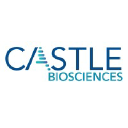Companies
Discover all trending biotech companies
Discover all trending biotech companies

Company Research Platform
Annual Revenue
$ 332,070,000
Global Employees
342
R&D Investment
12600000
This segment focuses on the development and commercialization of diagnostic tests for melanoma, a serious form of skin cancer. The primary product in this segment is DecisionDx-Melanoma, a multi-gene expression profile (GEP) test that assesses the risk of metastasis in patients with invasive cutaneous melanoma. Research and development activities include ongoing studies to improve the accuracy and clinical utility of the test, as well as exploring new biomarkers and technologies. The segment utilizes advanced molecular biology techniques, including gene expression profiling, to analyze tumor biology and predict patient outcomes. The impact of this segment is significant, as it helps physicians make informed treatment decisions and improve patient survival rates. Market positioning is strong due to the test's proven clinical value and the company's focus on personalized medicine. Future opportunities include expanding the test's applications and geographic reach, as well as developing new diagnostic tools for other dermatologic cancers. Regulatory and clinical aspects involve obtaining and maintaining FDA approvals and conducting clinical trials to validate the test's performance. Partnerships and collaborations with leading dermatologists and cancer centers are crucial for market access and clinical validation.
This segment is dedicated to providing diagnostic solutions for uveal melanoma, a rare cancer of the eye. The key product is DecisionDx-UM, a GEP test designed to predict the risk of metastasis in patients with this specific type of cancer. Research and development efforts are focused on refining the test's accuracy and expanding its clinical applications. The segment leverages advanced genomic technologies to analyze the unique genetic profiles of uveal melanoma tumors. The impact of this segment is substantial, as it offers critical prognostic information to guide treatment decisions for a patient population with limited therapeutic options. Market positioning is enhanced by the company's expertise in molecular diagnostics and its focus on rare cancers. Future opportunities include developing companion diagnostics and expanding into new geographic markets. Regulatory and clinical aspects involve obtaining necessary approvals and conducting clinical studies to demonstrate the test's efficacy. Partnerships with ophthalmologists and cancer specialists are essential for market penetration and clinical validation.
This segment focuses on the development and commercialization of diagnostic tests for squamous cell carcinoma (SCC), a common type of skin cancer. The primary product is DecisionDx-SCC, a 40-gene expression profile test that predicts the risk of metastasis in patients with SCC who have one or more risk factors. Research and development activities include ongoing efforts to improve the test's accuracy and expand its clinical utility. The segment utilizes advanced gene expression profiling technology to analyze the tumor biology of SCC patients. The impact of this segment is significant, as it helps physicians identify patients at high risk of metastasis, enabling them to make more informed treatment decisions. Market positioning is strong due to the test's ability to provide personalized risk assessment for SCC patients. Future opportunities include expanding the test's applications and geographic reach, as well as developing new diagnostic tools for other dermatologic cancers. Regulatory and clinical aspects involve obtaining and maintaining FDA approvals and conducting clinical trials to validate the test's performance. Partnerships and collaborations with dermatologists and cancer centers are crucial for market access and clinical validation.
This segment is focused on the development of diagnostic tests for esophageal cancer. The company is strengthening its commitment to esophageal cancer awareness through collaborative partnerships. Research and development activities include ongoing efforts to improve the accuracy and expand its clinical utility. The segment utilizes advanced molecular biology techniques. The impact of this segment is significant, as it helps physicians identify patients at high risk, enabling them to make more informed treatment decisions. Market positioning is strong due to the test's ability to provide personalized risk assessment for esophageal cancer patients. Future opportunities include expanding the test's applications and geographic reach, as well as developing new diagnostic tools for other cancers. Regulatory and clinical aspects involve obtaining and maintaining FDA approvals and conducting clinical trials to validate the test's performance. Partnerships and collaborations with gastroenterologists and cancer centers are crucial for market access and clinical validation.